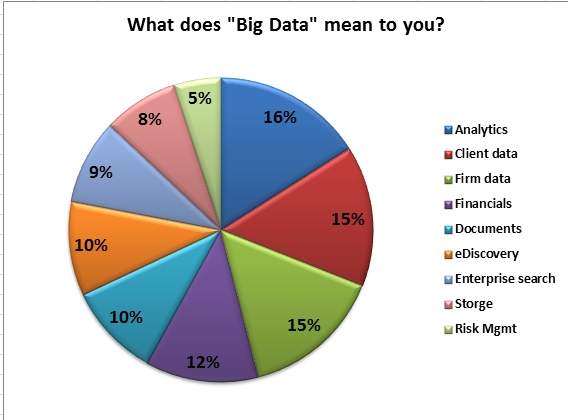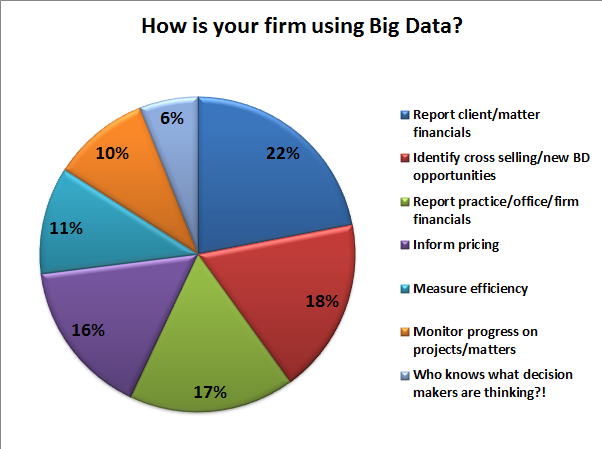We also want to seek your input, via an online survey, regarding what interests and worries you have about legal IT – “nothing” is not going to be a good or frankly a thoughtful response, since technology is a part of everything we do. Becoming an ostrich will only find you completely buried in the sand as the next wave of progress advances
Leaving technology to others is also not optimal, since we are really talking about our business challenges and how to solve them, and if you are in a leadership position your informed input is essential to your firm’s success. Look for the survey in the near future.
Back to ILTA: I was asked to participate in a panel on Big Data. Our panel consisted of an AmLaw 50 technology lawyer, the CIO of a mid-size US firm, a Big Law information governance manager (who previously practiced law at his firm) and a Global 20 information management leader.
What strikes me about conversations on Big Data is that they are varied. Sure it’s nice to have conversations with people that are varied and interesting, but if you are trying to tackle big problems, then more focus is needed. Unfortunately, Big Data means different things to – well, to just about everyone – as polling of session attendees revealed. As far as Big Data goes, we may still be at the stage of the parable of the blind men and the elephant; even though it’s all really the same thing, each of us has only a limited window on what it is, and therefore our own distinct perspective.
As the session began I remarked that Big Data discussions in law firms reminded me of the KM discussions we all had back in 2005, when many set out to solve knowledge management “problems,” often by acquiring KM “tools,” before we knew what KM meant to us – before we had defined in sufficient detail the business problem we were trying to solve. Are we trying to do this again with “Big Data”?
In the corporate world Big Data has different meanings as well. In a retailer like Macy’s or Amazon it is more than likely customer marketing data. In an engineering focused company it might be product R&D data. Whatever the focus, Big Data is important data, supporting important decision making.
During the session we queried attendees using ILTA’s conference “app” that allowed participants to respond to polling questions in real-time using their iPhone, iPad or other mobile device. When we asked session attendees the first of three questions, “What does Big Data mean to you?”. the responses revealed a broad variety of concern:
What do these responses tell us? That we don’t know what Big Data is and that we are wasting time? No, not really. What it does document is that “Big Data” means different things to different firms – and that’s OK. It means that regardless of the overarching term – Big Data – we are working on big business problems within our respective firms, whether it’s client intake, client marketing data, or the computer storage of large volumes of data, as three examples.
The just released Gartner 2014 Hype Cycle for Emerging Technologies Report, a curve of technology expectations, shows that Big Data has just crested the Peak of Inflated Expectations and was dropping into the Trough of Disillusionment.
So, my advice: Don’t get hung up on the term “Big Data.”
The problems we are trying to solve, while large in size and importance, are discrete business problems, so let’s focus on the distinct results we are looking to achieve and disregard the hyped-up terms that are over-inflated and over-used by the press.
Let’s look at our second polling question, “How is your firm using “Big Data” to drive decisions?”
There is some blurring of the results due to cross classification of answers, but the results along with the parallel discussion had us talking over a number of primary areas of concern:
- Client data: Finding ways to better understand our clients, with respect to client needs in addition to marketing approaches.
- Document management again is a focus for some: Not so much the historical concern with the pure document “inventory,” but more associated with business and knowledge intelligence embedded within our massive repositories.
- eDiscovery was also acknowledged as a “Big Data” domain, and of all the areas discussed is the most mature, and successful, user of “big data” technology tools.
- Much discussion surrounding the question of how firms are using Big Data centered on internal firm financial / performance results – and the foundational pricing and profitability of matters.
- The winner in the discussion and the aggregated poll responses? Better understanding the profitability of matters: before engagement, during the engagement, and afterwards. Did we actually meet our forecasted metrics at the conclusion of the engagement? Or did we just see the illusion of profitability – receiving the client’s check and getting cash in the bank? And while it wasn’t directly discussed, let’s not forget to use our “big” data to understand why we didn’t win engagements, as well as how we performed on those where we successfully proposed.
Legal Project Management, or as some are referring, Legal Process Management, and matter staffing and profitability were of high importance with the entire group, whether you call it Big Data or a Big Business problem.
The danger zone is the 6% responding, “Who knows what the decision makers are thinking!?” If you and your team don’t know and communicate the top business challenges you face, then your thoughts are lost in “Big Data’s” dump, and you need to quickly dig yourself out and concentrate the efforts of your team.




